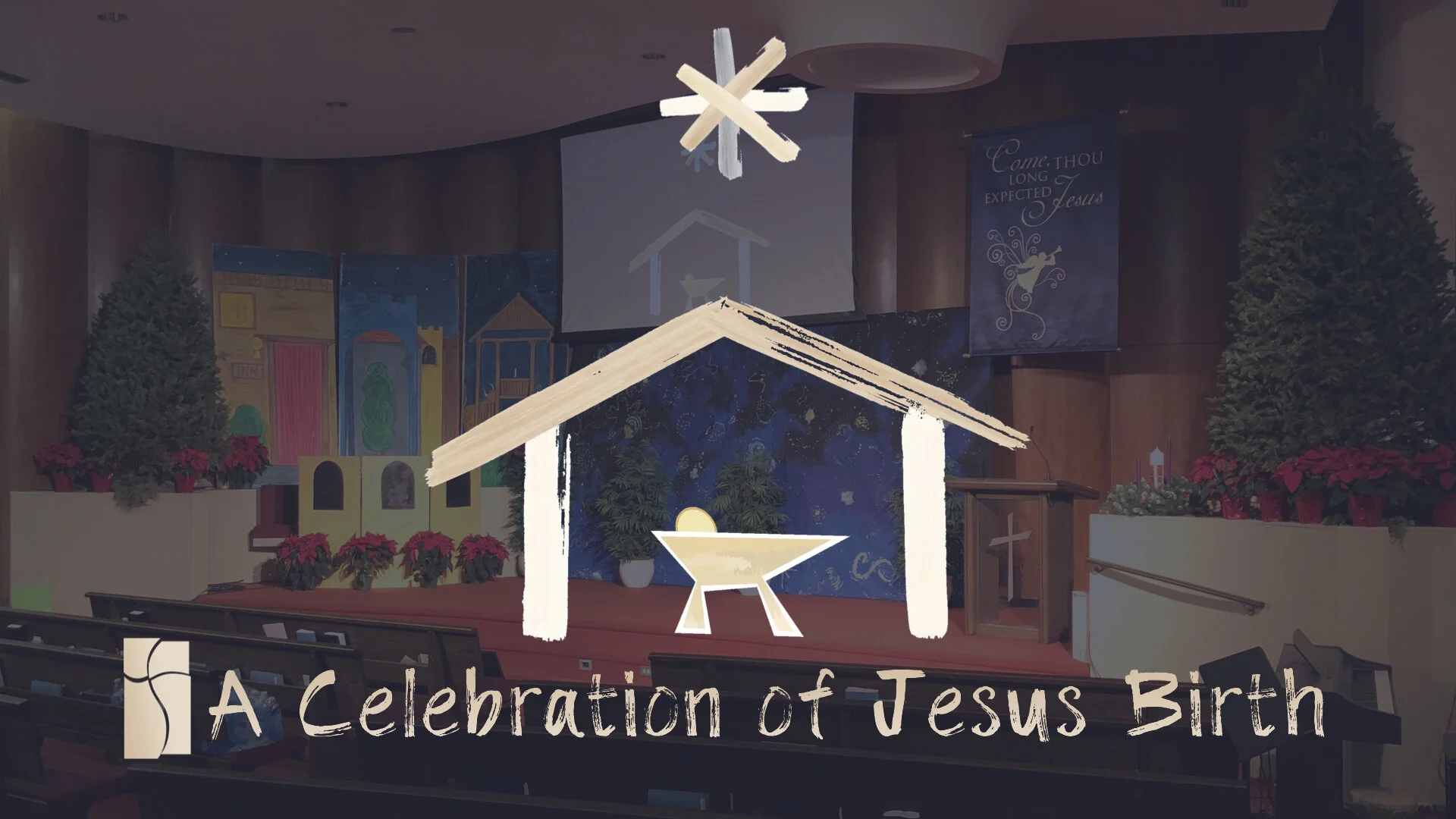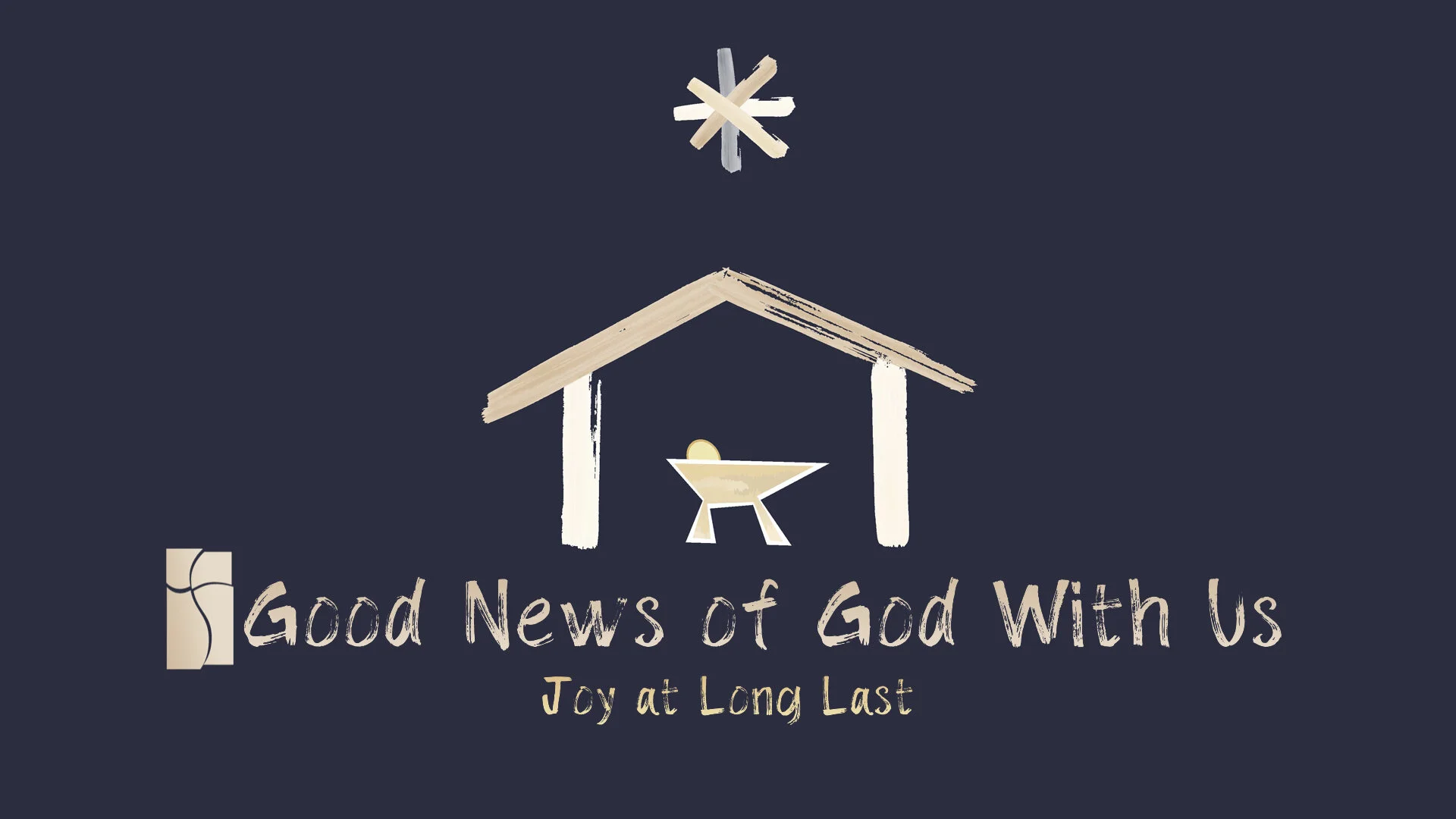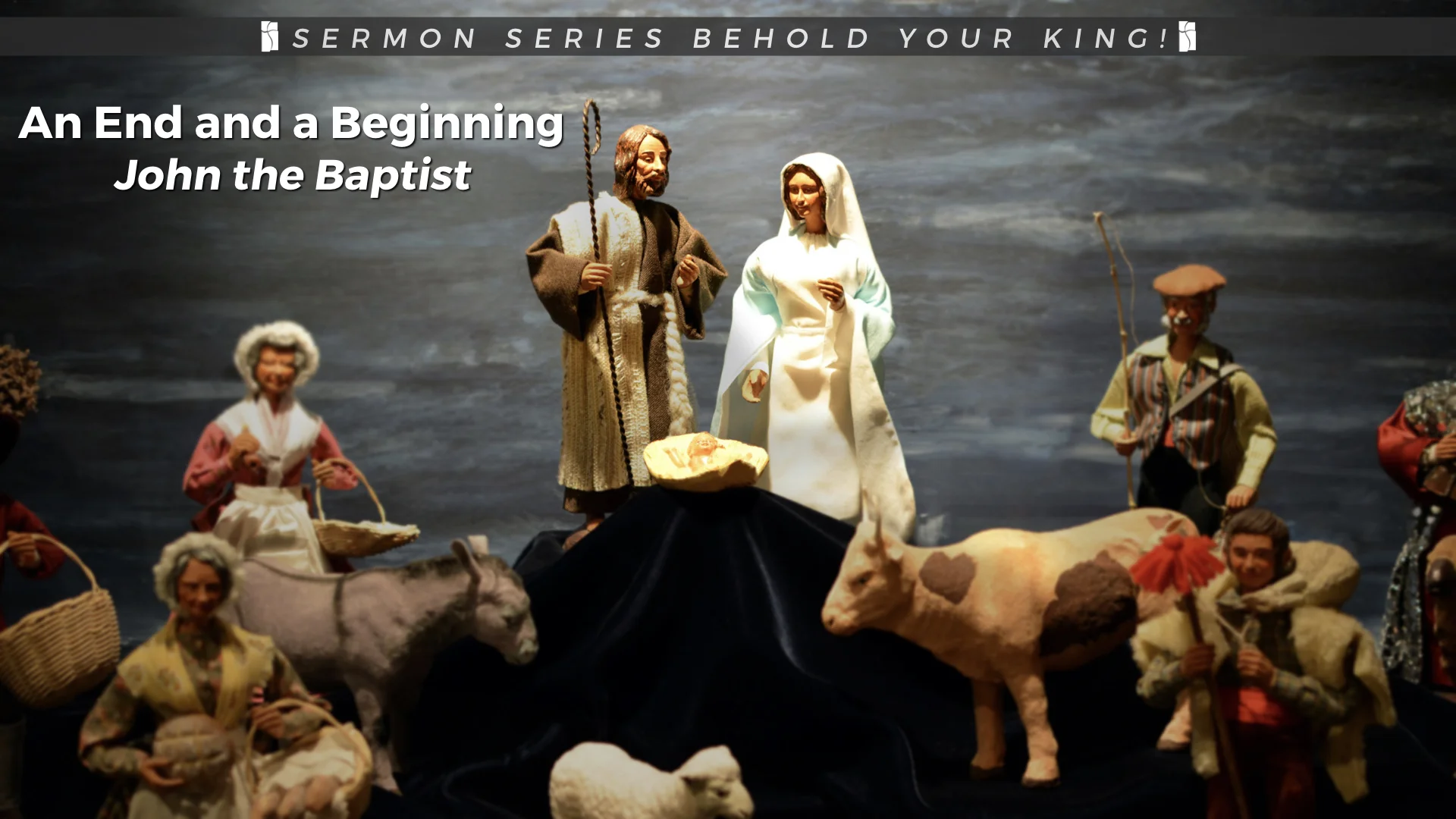Good News for a Future
Emmanuel – God with Us Jesus’ story, like other human stories, begins with birth and goes to death. The same but different. Something more is happening so that that event can become part of every human life – our life. Our theme: “God with Us.” Unexpected entry; Refugee; at Long last. God chooses a very distinctive way to create a bridge from God to Us. It’s truly wise and powerful beyond imagining, but overturns every structure of smart power we build. We humans live in a moment. The limitation of life unfolds in Genesis. The Big Bang, 13.75 billion yrs ago. All written human history, 6,000 yrs. But in the scale of God’s infinity, the Big Bang is hardly longer ago than the pyramids or cave paintings. Other things determine value, meaning. 2 Pet. 3:8. God’s bridge draws my human life into the long past and future of the human drama and into the heights and depths of God’s life. Being Part of a Long Past and Long Future We have no idea what it’s like to be God. Timeless?
A Celebration of Jesus Birth
Joy at Long Last
People Waiting for Joy through Long ... Experience Luke takes us into the life of faithful Jews near the end of Herod’s violent reign. Zechariah/ Elizabeth; Mary/Joseph; Simeon and Anna. Two young, four elderly. The old ones lived through the old days and know they weren’t better. They carry the long expectation. Isaiah, before the exile, foresaw Israel’s royal hope cut off. But a branch would grow from the stump. He would bear God’s Spirit; God’s heart for justice; God’s renewal. What joy! Things started happening: Gabriel, Zechariah, Mary, Elizabeth, John’s birth. Mary and Joseph bring an astonishing child (angels-shepherds) to the Temple for faithful obedience, 6 bc.
God's Unexpected Entry
Many Anticipations Become One Event After disastrous exiles that ended kingdom in Israel and Judah– prophets and people anticipated the return of God in glory. When, how would he come? Restored Temple. New King-Messiah. Pure priest. Son of Man–people receive kingdom. Suffering servant–for people. Could Gentiles be included? Or a purified people? Or do we just keep up tradition? Jesus, in his teaching and action, is the first to unify and embody all these anticipations. People struggled to grasp uniting glorious Messiah with suffering servant, transformed temple, and included outsiders. In Jesus’ death and resurrection they realized that Jesus was the very Advent of the One God, who used the human forms and anticipated images to show himself in the person of Jesus – the one and only Son, glory, and suffering.
An End and a Beginning - John the Baptist
Matthew 3:1-12
John the Baptizer and Elijah
Matthew introduces John as a known person: “Baptizer” (also Josephus). Famous as prophet and martyr killed by Herod Antipas. He is the renewal of prophecy cut short by corrupt power.
Mt illuminates his role by two scripture references. Isaiah 40: Wilderness, Exodus, hope for end of exile, renewal. Preparation for God. This is what the Gospel is about. Nothing less.
Also the sign of Elijah that ends Malachi. The call for renewal before God’s Judgment.
The surprising way that God comes. “God with us” as the exiled son. God as human Messiah.
A Baby and Wise Men from the East
Matthew 2:1-12
How Do You Know What is Happening?
Matthew wants us to see beyond the surface: Jesus Messiah, Son of David, Son of Abraham. He led us through royal/mixed genealogy. He showed us Mary’s unusual pregnancy, Joseph’s challenge of faith, new meaning of “God with us.” He says hardly a word about Jesus’ birth itself, but brings in other eyes, outside witnesses of events around the birth.
The gifts of the Magi are vulnerable to misuse, adapting the story to our worship of Mammon. But for Matthew this is the clash of two visions of kingship, power, what really matters. The Magi are the world/nations at large, given an opportunity to see what God’s people, who should have been eagerly looking, cannot see because of corrupt, blinding power.
The Surprising Birth of Emmanuel
Matthew 1:18-25
The Messiah’s Coming and a Crisis of Faith
This is the first of four Sundays of Advent: Our faith in a God who intervenes, comes into human life and experience in a totally remarkable way: incarnation to resurrection. He unites the life of God with the life of God’s creatures, us humans. He changes Human possibility by what he does and how he remains with us. Jesus is that event of intervention, Advent.
Messiah means “Anointed King”– the promise to David. Mt’s tells Jesus’ birth stressing the confrontation between the coming of God’s Messiah and Herod the “King of the Jews” established on his throne not as “son of David” but by normal power, Rome, conquest, control. We’ve reflected on his royal genealogy, but strange. God’s work, like Genesis.
God's Story: Generations of Anticipation
Matthew 1:1-17
Behold Your Anointed King – Think of the Pattern
We like to think in patterns. Generations: Lost (1880-1900), GI (1901-24), Silent/Beat (1925-44), Boomers (1945-64), Gen X (1965-84), Millennials (1985-2004), Post Millennials (2005-). Now many are absorbed with personal genealogy, genetic background, forensic genealogy.
Matthew is beginning Jesus’ story. Genealogy says something. This is a king’s list of ancestors. Few ordinary people could show such a list. Few today could without computers, databases. It is by fathers only, thus a single line, not a family tree. Thus through Joseph, not Mary.
Christ Comes to All the World
Romans 15:13-21
Apostle to Nations who’ve Never Heard of Jesus
Paul knew that he was called to a special role, as one saturated in the Law, a Roman citizen, a Greek-speaker, confronted by the resurrected Jesus, sent especially to cities/people across a pagan Roman empire. He worked in Syria, Arabia, Asia Minor, Greece, now Rome, Spain. Paul has a strong sense of Advent. God is always breaking in, coming to new peoples new lives. He’s seen it. Participated. That’s the particular calling he received. Rome’s empire was tied to its own throng of gods. The Jews’ story seemed superstition. – A crucified Jew as Lord? Paul was the instrument of Advent in regions beyond what’s known in Acts – Illyricum.
Christ Opens God’s Welcome
Romans 15:7-13
Advent – Story of the Event that Shapes Us
Advent means “Coming.” The coming of Jesus as Messiah. All that that event means. No one knows Jesus’ birthday, but Advent/Christmas is about structuring life around the events of God’s promises of grace and salvation flowing from his love: Powerful, continuing Drama: One man (Abram) –> a Nation (Israel) –> One man (Messiah Jesus) –> the Whole World.... Paul comes to the climactic end of the main body of Romans: A way of life and relationships that flows from the whole story. The heart of Christian life & ethics – not general morality. Welcome – As the Messiah welcomed You – God’s Glory. What God has done for us in Jesus Christ, we learn as the permanent heart of God, we learn to practice toward others.
A New Year’s Message from the Prince of Peace
Matthew 6:24-34
The Challenge of Mammon and Human-size gods
The Prince of Peace (Isa 9:6; Lk 2:14) speaks on a mountain to crowds of poor laborers, farmers, sick people, about the in-breaking of God’s rule. Seek God’s kingdom now! (Mk 1:15; Mt 6:10)
Israel’s ancient prophets attacked idolatry. It was about the people’s desire for human-size gods they can bargain with, get stuff from. It was also about reality. Serve Baal to get fertility and you serve nothing. Self-deception. The one living God is already there freely creating that fertility. But no bargain. God’s purposes are larger than fertility.
Jesus says, “You cannot serve God and Mammon.” Mammon is Aramaic for ‘stuff,’ ‘money,’ ‘what you trust.’ Jesus personifies it as the god who offers to supply all that. Matthew and Luke leave it as a god’s name. Mammon is the practical, powerful, human-size god who promises to provide all and secure all who serve him. He is money, power, sex, intellect, control, family, race, violence, war, progress, greed, etc. He’s the default god of humanity. We anxiously serve without realizing. (David Foster Wallace, “This is Water” 2005).
Proclaiming Peace to Far and Near
Ephesians 2:14-22
Advent: He came with Good News of Peace
Isaiah looked with hope for God’s intervention – a child, Prince of Peace (Isa 9:6). The angel at Jesus’ birth echoed his words: to you is born a baby in a trough, Savior, Messiah, Lord.
What is a Prince of Peace? One who imposes peace – Augustus? Paul’s Advent meditation points to Jesus coming to proclaim peace (Isa 52:7) to those far and near (Isa 57:19).
But Jesus is not just the messenger or a conquering power commanding peace. Paul says Jesus himself is our peace. He’s writing to people in societies of intense conflict, with deep societal divisions and fears: Jew-Gentile, Roman-Greek-other ethnic groups, slave- free, male-female. Acts 19 show explosive fears, superstitions, and conflicts in Ephesus.
Paul had seen the how Jesus (as message and active presence) had brought together Jews, Romans, Greeks, the enslaved, the fearful into a new unity. It was who Jesus is – his life, message, cross, resurrection, Spirit – that embodied a new Adam, human being, the Suffering Servant of Isa 53, and that showed God’s purpose to unite everything in him.
A Guide in the Way of Peace
Isaiah 52:7-10, Luke 1:68,70, 76-79
What Would a Prince of Peace Look Like?
In the context of Advent, the vision of a Prince of Peace may seem obvious. But in Jesus’ time, Augustus Caesar was the great prince of Peace, conquering all: peace under Rome.
Jews chafed under his appointed rulers over the land. God, not Herod or Pilate should rule. Where was Isaiah’s promise: “Your God is King”? When would “the coming one” come?
Jesus’ whole story is that coming (Advent): Birth, ministry, passion, resurrection, all of it. People thought they knew what they were looking for – their own holy, good Augustus. After all, who is a more absolute king than God? They were ready to join the revolution. Jesus comes calling followers to “the Kingdom of God.” What else could it mean?
Longing for a Prince of Peace
Isaiah 9:1-7
Longing for Peace in a Fear-filled World
We focused our Retreat on the call to be Fearless. This Advent season we are centering on one of its most basic, comforting, challenging ideas: Peace. The two interact together. We start from Isaiah’s celebration of the birth of a child (Handel’s Messiah, Isa 9:6). In the NT this passage echoes in Luke’s narrative of Jesus’ birth, in Matthew’s description of the start of Jesus’ ministry. Jesus is this “Prince of Peace.” But what does it mean?
Isaiah began prophesying in a time of powers pressing in on Judah (Israel, Syria, Assyria). Peace was a dream. A son is born in the Davidic royal family, possibly Hezekiah born to Ahaz. That child is a symbol of hope in a time of disaster. The prophet gives him the long prophetic name: Pele-yoets El-gibor Aviad Shar-shalom. Like the famous prophecy of a virgin conceiving (Isa 7:14; Mt 1:23), these words had an impact in their own time.
Living Expectantly: Expecting Tomorrow
Isaiah 40:1-11
Expecting the Unexpected Future
We’re looking into a new year that, as always, is full of unknowns. Politics, war, revolution, science, medicine, culture, economy, creativity, racial tensions, justice, decline, renewal.
A basic challenge of life is dealing with time. Our faith is very present-oriented. We are called to love and serve here and now. “I was hungry and you fed me...” (Mt 25:35) “Do not be anxious about tomorrow...” (Mt 6:34). I want to live this moment as a child of God, a follower of Jesus, and trust God for the future. Leave it in his capable hands.
Living Expectantly: Christ’s Birth & Grown-ups
Isaiah 11:1-9
A Branch from a Stump
We’re reflecting on some important passages in Isaiah’s prophecies that resonate powerfully in the birth and life of Jesus. We began with the sign of the birth of a child: “the virgin shall conceive and bear a son” (7:14); “to us a child is born, to us a son is given (9:6). God’s unique creative power breaking in to begin new life: Sarah & Isaac...Mary & Jesus.
But in Isaiah’s day, with faithless king Ahaz, it wasn’t enough. He wanted military help now, not God’s promises with whatever signs. It was the superpower Assyria who could bring in the god of war. Ahaz sold his nation and religion to Assyria for immediate war help.
Learning Expectation: Christ's Birth & Children
Isaiah 9:1-7
Did you grow up as a kid looking forward to Christmas?
Different cultures have different expectations. I did. Not too much religious stuff. But the tree and the gifts? Yes! We like to give and receive gifts. It's easily distorted, commercialized, but a good instinct. (Think about giving: Google "Advent Conspiracy" for a wider vision of giving gifts.)
Part of what we love in the holiday as children is the thrill of expectation. Part of what we love as parents is watching and fostering our children's expectation. Yes, it's a rather artificial ritual, but it can point to a deep truth, rich and complex: learning to live life expectantly -- in hope. Helping a child to live expectantly, creatively, in hope is a great gift. The gifts the Wise Men bring symbolize the hope and expectation that they believe are embodied in that unknown child, without status, but marked by signs for the future.











